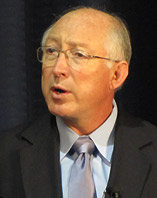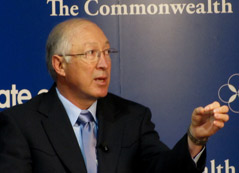San Francisco, September 19, 2011
United States Secretary of the Interior Ken Salazar made an appearance at Climate One at the Commonwealth Club in San Francisco primarily to discuss water issues. In addition he made some comments regarding energy, climate change, and fracking fluids, excerpts of which are included in this video.
Selected Excerpts:
 |
| Interior Secretary Salazar |
Question by Greg Dalton: “When Barack Obama clinched the Democratic presidential nomination in 2008 he gave a speech with which he said people would look back on his presidency as a time when the rise of the oceans began to slow and our planet began to heal. Since that time the administration has opened up 2.3 billion tons of coal mining in Wyoming, the Arctic potentially to drilling, and potentially on track to approve a Keystone XL pipeline which would bring some of the dirtiest fuel from the Alberta tar sands to Texas. So how does that record square with the presidents pledge address climate change?”
Secretary of the Interior Ken Salazar:
0:40 ‘I think, Greg, what one must do is put the issue in the context of what it is that we’re doing on energy, and I think that when you look at the President and the energy team and the programs that we have put forward we are doing more that what has been done in the time of history.’
 |
| ‘The time will come when the Congress will awaken to the need to have a comprehensive energy and climate change legislative framework’ |
‘On fuel efficiency, our vehicles are going to be getting forty to fifty miles to the gallon we’re going to be saving billions of barrels of oil a year. That means less CO2 that’s going to been burned. We’ve embraced a whole new ethic on what we’re doing with renewable energy, from solar to geothermal to wind – that is moving forward. We’ve invested billions of dollars in efficiency and in new materials to try to deal with the energy issue which is really the nexus between what happens here on Earth and the changes in climate. Now, have we been able to do as much as we wanted to do? The answer is no. We wanted to pass comprehensive energy and climate change legislation bills, we worked on that very hard.’
‘…Our own view as an administration is that the time will come when the Congress will awaken to the need to have a comprehensive energy and climate change legislative framework. … the principles that will keep driving this agenda forward in the years and the decades ahead, are at the end of the day about national security and the fact that now we’re so dependent on countries that really don’t have our interests at stake, our economic security, because we are now sending 750 billion dollars a year overseas, and finally the environmental security of the planet. ‘
Coal:
3:04 ‘The fact of the matter you know coal is one of the greatest emitters of C02, and there are ways in which you can deal with that, including the conversion … of coal plants over to natural gas which is much less CO2 emitting. But … almost 50% of our electricity comes from coal supplies so we need to find the right way to transition from coal to the new energy world, and in addition to that and something which we worked on very hard, is to find a way to find a future for coal supplies in the United States by finding a way of burning it cleanly so you won’t have the same problems of the past.’
‘And so it’s carbon capture and sequestration, and moving forward to those kinds of projects which hopefully we’ll be able to find that one of the most abundant energy supplies that we have here in America will have a place in the future energy portfolio of the country.’
Fracking fluids:
‘Seven or eight months ago we brought together a group of industry leaders and others, the Department of Interior to talk about fracking and disclosure. My sense is that many of the responsible actors in the industry want to make sure that there is disclosure of fracking fluids, because they see it as I see, they see it as David and I have seen it over the last several years, and that is that unless industry is forthcoming and is disclosing its fluids that it’s injecting into the underground, it’s going to become the Achilles heel that essential destroys any future for natural gas industry in shale here in the United States. And so, we’re in the process of making some decisions that we’ll be to be rolling over the next several months about how we’re going to deal with the issue of fracking fluids on the public estate, which is huge, because between lands that we control at Interior, as well as those that we control on behalf of the Department of Agriculture, there are about 700 million acres in the United States.’
Report by James George



























































